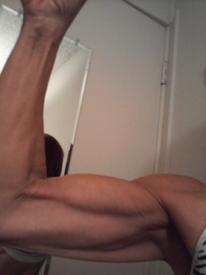Lifting weights & calorie reduction

MoveTheMountain
Posts: 764 Member
So, we all know that if calories out exceed calories in, we lose weight; and vice versa. Well here's a question.. since it's generally agreed upon that I can't gain muscle mass while in a calorie deficit, what *does* happen to skeletal muscle during a resistance training regimen and restricted calories? Sure, in theory, we're burning fat... but what is the impact on the skeletal muscle if it's not getting any bigger?
0
Replies
-
If you're eating cleanly and enough protein then you should retain the muscle you have and lean out...0
-
bump0
-
I'm also wondering about the answer to this. Surely your muscles must get stronger doing training provided adequate protein intake.
Is it a matter of bulk vs lean muscle (sorry if this is a dumb question)?0 -
I'm also wondering about the answer to this. Surely your muscles must get stronger doing training provided adequate protein intake.
Is it a matter of bulk vs lean muscle (sorry if this is a dumb question)?
Gaining strength doesn't mean you are growing new muscle. It means you are making the muscle you already have stronger.0 -
I could get all scientific but I don't have the time right now....Basically, it is essential!!! Lift heavy while you are in a calorie defict to help retain your muscle mass...your body will thank you later. Many studies have shown that heavy weight training while in a deficit doesn't increase muscle mass (not talking about newbie gains or morbidly obese muscle gains) but does help you to retain what you have. So those people that think they are getting ripped as they lose weight are wrong....they are just losing the fat that is covering their already there muscle. As far as getting stronger....it depends on the weight you use (max %) and the reps...different types of lifting have different effects. Example~body builders do not train like competition weight lifters.0
-
Your answer can be found in this article and the 2nd one in the series.
http://www.bodyrecomposition.com/training/weight-training-for-fat-loss-part-1.html
Essentialy, if you continue strength training you will maintain neuromuscular adaptations (strength). When reducing calories, Lyle says to reduce volume (sets and possible reps) but maintain intensity (weight on the bar). I am doing this now. I am on a 30 day cut. I have dropped my strength routine from 5x5 to 3x5 and am still progressing weight but weekly not session to session. Eg, add 5 lbs to my squat every week instead of every session.0 -
Ont of the best questions I've ever seen on here . . . . . thanks.0
-
I'm also wondering about the answer to this. Surely your muscles must get stronger doing training provided adequate protein intake.
Is it a matter of bulk vs lean muscle (sorry if this is a dumb question)?
Nope, not a dumb question at all. I would agree that your muscle strength must improve, even if the actual size isn't increasing - which isn't a bad thing, of course. All muscle is lean muscle, and there's really no such thing as 'bulk' - bulk is just a nice word for fat, I think. So, losing bulk/fat while at least maintaining muscle mass is a fine goal. But how do you account for strength increases? I would think that muscle density must increase even if size does not.0 -
I'm also wondering about the answer to this. Surely your muscles must get stronger doing training provided adequate protein intake.
Is it a matter of bulk vs lean muscle (sorry if this is a dumb question)?
Gaining strength doesn't mean you are growing new muscle. It means you are making the muscle you already have stronger.
I'm sure you're right. I'm wondering (1) how, and (2) what the different mechanisms are the will allow you to build strength in a calorie deficity that won't allow you to gain size while in a calorie defici.0 -
I could get all scientific but I don't have the time right now....Basically, it is essential!!! Lift heavy while you are in a calorie defict to help retain your muscle mass...your body will thank you later. Many studies have shown that heavy weight training while in a deficit doesn't increase muscle mass (not talking about newbie gains or morbidly obese muscle gains) but does help you to retain what you have. So those people that think they are getting ripped as they lose weight are wrong....they are just losing the fat that is covering their already there muscle. As far as getting stronger....it depends on the weight you use (max %) and the reps...different types of lifting have different effects. Example~body builders do not train like competition weight lifters.
Hi, and thanks. I totally agree with everything you say - but what I'm actually looking for is the science. I totally get that it is important to keep weight training while restricting calories, and why. But I want to know what is your body doing under these conditions. How does it read the scenario of 'lower calories plus strength training,' and say 'ok, under these conditions, my physiological response will be X."0 -
Your answer can be found in this article and the 2nd one in the series.
http://www.bodyrecomposition.com/training/weight-training-for-fat-loss-part-1.html
Essentialy, if you continue strength training you will maintain neuromuscular adaptations (strength). When reducing calories, Lyle says to reduce volume (sets and possible reps) but maintain intensity (weight on the bar). I am doing this now. I am on a 30 day cut. I have dropped my strength routine from 5x5 to 3x5 and am still progressing weight but weekly not session to session. Eg, add 5 lbs to my squat every week instead of every session.
Thanks, I have the article up now. I love this guy, and his website is fantastic. I hadn't seen that article before.0 -
Strength isn't just from muscle. CNS adaptation and technique can both cause strength increases while in caloric deficit. However, those both can eventually plateau, and the only way to get further strength gains is caloric excess and muscle hypertrophy.I'm also wondering about the answer to this. Surely your muscles must get stronger doing training provided adequate protein intake.
Is it a matter of bulk vs lean muscle (sorry if this is a dumb question)?
Gaining strength doesn't mean you are growing new muscle. It means you are making the muscle you already have stronger.
I'm sure you're right. I'm wondering (1) how, and (2) what the different mechanisms are the will allow you to build strength in a calorie deficity that won't allow you to gain size while in a calorie defici.0 -
Strength isn't just from muscle. CNS adaptation and technique can both cause strength increases while in caloric deficit. However, those both can eventually plateau, and the only way to get further strength gains is caloric excess and muscle hypertrophy.I'm also wondering about the answer to this. Surely your muscles must get stronger doing training provided adequate protein intake.
Is it a matter of bulk vs lean muscle (sorry if this is a dumb question)?
Gaining strength doesn't mean you are growing new muscle. It means you are making the muscle you already have stronger.
I'm sure you're right. I'm wondering (1) how, and (2) what the different mechanisms are the will allow you to build strength in a calorie deficity that won't allow you to gain size while in a calorie defici.
Sure, which makes perfect sense. But at that point, fat loss is pretty much out the window.0 -
Great questions.
I admit I have a hard time understanding just why one cannot increase muscle volume on a deficit. If all of the right nutrients are there, and your body does go to fat reserves for energy when in need, then why? Why isn't there a way to use the energy from our fat to supplement what we eat to sustain ourselves as well as fuel muscle growth?0 -
Natures freak here then because I eat about 3000 cals a day and lift heavy 3 days per week and 5 30 minute cardio sessions. I still weigh the same 275-280 I did for the last 18 months but have gotten significantly muscular while losing fat.
I am only just now transitioning into a more dedicated loss phase with about 2400 cals low carb.0
This discussion has been closed.
Categories
- All Categories
- 1.4M Health, Wellness and Goals
- 398.2K Introduce Yourself
- 44.7K Getting Started
- 261K Health and Weight Loss
- 176.4K Food and Nutrition
- 47.7K Recipes
- 233K Fitness and Exercise
- 463 Sleep, Mindfulness and Overall Wellness
- 6.5K Goal: Maintaining Weight
- 8.7K Goal: Gaining Weight and Body Building
- 153.5K Motivation and Support
- 8.4K Challenges
- 1.4K Debate Club
- 96.5K Chit-Chat
- 2.6K Fun and Games
- 4.8K MyFitnessPal Information
- 13 News and Announcements
- 21 MyFitnessPal Academy
- 1.6K Feature Suggestions and Ideas
- 3.2K MyFitnessPal Tech Support Questions








